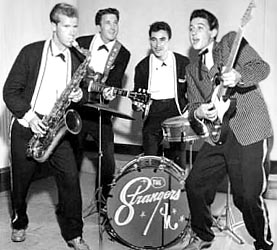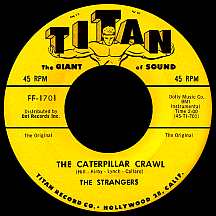THE STRANGERS
The Caterpillar Crawl
Joel Scott Hill played a mean electric guitar. The native of Naples, in eastern Texas, moved to the Linda Vista district of San Diego, California, when he was eight. He picked up his first axe a few years later and had a band by 1956 while still in high school. His cousin, Jeanette Hicks, had been working steadily as a country singer, recording for Okeh Records and performing throughout the south (she scored one hit, "Yearning," a duet with George Jones on the Starday label in 1957). On a summer visit back home, Joel headed to Shreveport (90 miles east of Naples). He had sharpened his six-string expertise well enough that Jeanette put him to work playing lead guitar during one of her appearances on the syndicated radio and TV show The Louisiana Hayride. It was an exciting professional debut for the teenager; Johnny Cash and Johnny Horton were also featured performers that night.
When Joel returned to San Diego he started a new band that had as many as six members at a time; the lineup eventually boiled down to bassist Harold Kirby, sax blower Ronny Lynch and drummer Johnny Callard. Calling themselves the Rebels (around the same time Duane Eddy's group of the same name emerged and a couple of years before Buffalo, New York's Rebels hit the scene), the group found steady work in 1957 and '58, often playing rock and country songs for servicemen in the San Diego area, home of the largest Naval base on the west coast. The exposure led to one recording session for Hollywood, California's Era Records, the result a vocal performance of "Marathon Rock" that the label didn't bother to release (the same song, credited to the Rebels and released on the Dore label later that year, was by a different group).
Jim Lee, a friend from high school, became their manager in 1958, about the time they changed the band's name to The Strangers. He got them in the door at Titan Records, an independent Los Angeles startup run by George Brown. A couple of hot instrumentals were improvised in the studio by the band (who shared writer credit), the most promising a rockin' tune they called "The Cockroach Crawl." Brown didn't like the title, so it was changed to "The Caterpillar Crawl," only slightly less creepy by my calculations. The two minute track was a slow-burning scorcher, taking '50s rock to a level only Link Wray had attained; Hill could really bend a note, his guitar work reverberating to the point of momentarily turning a transistor radio into a vibrator. Faster-tempoed flip side "Rockin' Rebel" gave off a similar resonance (could it be possible Buffalo's Rebels were familiar with this recording when they changed their name to Rockin' Rebels a few years later? One can only guess).

"The Caterpillar Crawl" took off in Southern California in the summer of 1959 and caught on around the country shortly afterward, slithering into the L.A. top 20 in September at the same time it reached the top 50 nationally, mostly on the strength of sales and airplay in the western states. New York City-based Kapp Records released a version by Dick Dixon and the Roommates that went nowhere, but its existence was reason enough for Dot Records (distributing the single for Titan) to press copies with "The Original" clearly noted on the label. Strangers follow-up "Hill Stomp" doubled the tempo but faltered on the radio front. Johnny Callard was the first of the guys to step away and join the rat race. Replacement Jimmy Marino, a bit older and with several years of experience, picked up Johnny's drumsticks and let 'er rip. Two more Titan singles, "Boogie Man" and "Navajo," were issued in 1960. A pop-rock vocal single was pressed in limited numbers on the Trans American label the following year; "Little Lover" was credited to Joel Hill with the Strangers. After that the band members went their separate ways.
Hill continued honing his nimble-fingered technique, first with his own group the Joel Hill Three (or Trio, or Band, whichever name felt right at any given moment). He continued working with Jim Lee, who penned and produced several singles for Chris Montez on the Monogram label, an Era subsidiary, including "Let's Dance," Montez's breakthrough '62 party smash. Monogram released three 45s by Joel Hill in 1963 and '64, some of them instrumentals, some vocal efforts; some written by Lee, some not. "Look Out," in 1964, suggested a new group had been formed: Joel Hill and the Invaders was either a short-lived band or a group of hired session musicians.
Hill remained a part of the music business for many years, working the club scene in Los Angeles and becoming well-known among fellow musicians. In 1971 he collaborated with ex-Turtles drummer John Barbata and former Flying Burrito Brothers bassist Chris Ethridge (who'd been in at least one of Joel's previous bands) on the album L.A. Getaway, then joined Canned Heat as replacement for Alan "Blind Owl" Wilson, who had fatally overdosed in September 1970. In '75, Ethridge reformed the Burrito Brothers, who had split a couple of years earlier; Joel Scott Hill lent his considerable talents to the band for a short time.


